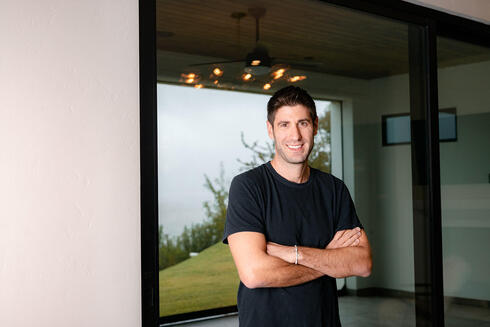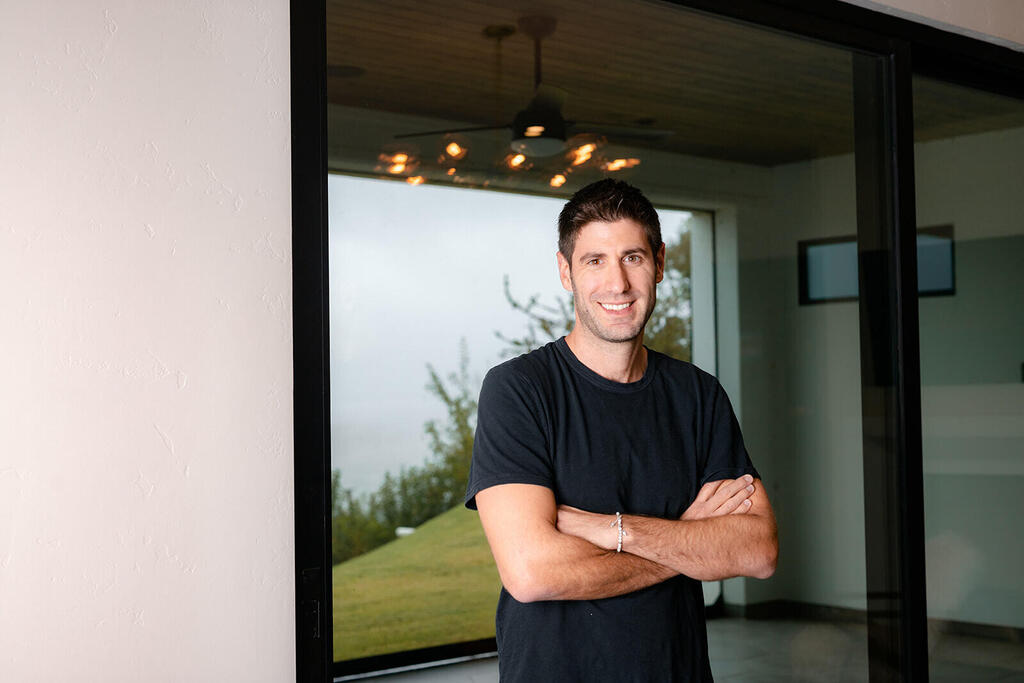
Island co-founder Dan Amiga: "War or no war, good companies will succeed"
Island’s rapid growth during a tumultuous period underscores Dan Amiga’s belief that Israeli high-tech companies are built to withstand adversity. The company not only raised significant capital but also continued to expand its workforce and customer base.
Optimism is essential for entrepreneurs and investors in Israel, and Dan Amiga, a serial entrepreneur and investor, is unabashedly optimistic.
Despite significant challenges, such as 40% of the employees at Island, the company he founded and serves as CTO, being drafted into the reserves at the start of the war, the company raised $175 million at a valuation of $3 billion during the conflict. Additionally, the company recruited 50 new employees in Israel, adding to its 100 employees, while also maintaining a similar size workforce in the U.S.
October 7th found the company at a peak in sales—a young, three-year-old firm with new customers and developments. "We had to demonstrate to our customers that we could continue to operate while also supporting our employees. In the end, 40% of our employees were called to reserves, and those who weren't needed a support framework—explaining what was happening, when to return to work, and what to do if they didn't have a safe place at home or felt more secure at work. We explained to our employees that there were two options: either enlist in the reserves or, if not called, help sustain the economy. Our goal was to maintain the positive momentum," he says.
The first two weeks were very difficult for the employees, and Amiga had little time to think while communicating the situation to both the staff and investors. "In high-tech today, especially in startups, the average age is around 30. Many of them are in their twenties and were only five years old during the Second Lebanon War. They need structure, support, and security. In the end, something very solidifying came out of it—working together, supporting the same number of customers with half the manpower. This experience has been empowering, and it has also driven significant social action."
We have been living in a war routine for quite some time now, and although things have stabilized somewhat, can we say that everything is back to normal in terms of work and society?
"First of all, this is not a normal situation because we all have either workers in the reserves on the front line, or close family or friends who are experiencing difficult situations, injuries, or bereavement. Everyone knows someone who is deeply affected, so I wouldn't call it routine. However, there is a very deep understanding that we also need to be strong in the economy. Companies need to grow during this period. We are seeing acquisition offers, more recruitment, more money. Since October, we have raised hundreds of millions of dollars for Island and have grown significantly. I wouldn't call it routine, but rather a repeated daily conduct—fundraising, growth, and more."
Island was established as both an Israeli and American company. Amiga founded it together with Michael Fey, whom he met during the sale of Fireglass, a company he founded in 2013 and sold to Symantec for $250 million in 2017. This dual identity created solidarity—at the beginning of the war, Israeli workers donated money and vacation days, as did the American workers, he says.
Do you see more requests for relocation from Israeli employees, given that you are both an Israeli and American company?
"Actually, the opposite. Two of my senior Israeli employees, whom I've worked with for many years, returned to Israel during the war after living abroad for a long time. Both are married to American partners and have returned to Israel. It’s very moving. We haven’t seen relocation requests; if anything, people want to return."
Island is a cybersecurity company, a hot sector that has led recruitment efforts during the war, unlike other fields that have struggled. How do you see the role of cybersecurity in these times?
"We were the startup nation for cybersecurity, and these startups have brought a lot of innovation over the past 15 years. We are now seeing a wave that interests me more—large, growing, and mature companies in Israel. There’s Armis, Wiz, Island, and other good companies that are growing here, which I think shows a lot of maturity among entrepreneurs. However, I do think that Israel needs to diversify and lead in other areas too, like AI and other emerging fields. We need to constantly innovate and expand our strengths beyond cybersecurity. There are good companies, but there’s nothing quite like cybersecurity."
You mentioned Wiz—what do you think about their decision to reject Google’s acquisition offer?
"I wasn't in the room, and I don't have any inside information from the Wiz team, but I can say that a $20+ billion offer from a company like Google speaks to the quality of what we can achieve in Israel. You have to understand, Americans are not easily impressed—if they want to buy for $23 billion, it means it's worth $100 billion to them. And if Wiz turned it down, then they believe they can build something even bigger. I salute them for that."
You raised $175 million in the past year, but many other companies report difficulties raising funds from foreign investors. As an investor yourself, what advice would you give to entrepreneurs looking to raise money during the war?
"Investors are people who want to make money. In the end, they look at a company’s model, how well it is managed, and the quality of its product. I would advise entrepreneurs not to think that they can't raise money because of the war or the current situation. My advice is to improve your business—if the business is strong, you will be able to raise funds. American investors are close to Israel; they see that things are operating as usual. Every company has 'business continuity' plans—whether it’s a site or team outside Israel—but the core of the company should remain in Israel. This is not an excuse. Look at how many companies have raised money in the past year, billions have been raised."
So everything is normal, and there is no difficulty in raising funds?
"It's not because of the war. It has to do with small companies growing into big ones, with the ability to execute and the overall quality of the company. Good companies and good entrepreneurs know how to attract investors. I don’t think the war has anything to do with it. When you are an entrepreneur and start a company, you assume there will be tough times—this is something you have to account for. If you have sales, you will succeed."
As an investor, would you invest in Ukraine now, during the war?
"I wouldn’t have invested in Ukraine before either, but I don't think the situations are comparable. I invest in Israel because I believe in the management capability and talent here. We have strong people, and as an investor, there are good opportunities. I’ve invested a lot in the past year. I believe we will come out of this situation much stronger both in terms of security and economically."
You’re very optimistic.
"If you’re not optimistic, you can’t start companies or invest in them. What encourages me is that this generation of 20-somethings will be very strong and resilient, and we can build on that to move forward. We’ve always talked about how high-tech workers are spoiled, growing up with iPhones in hand and only caring about themselves, but now we see how the situation has changed and how they have taken on so much. It’s almost unimaginable—people who are in Gaza one day and in the office the next.
“There’s also the other side of how our high-tech sector has rolled up its sleeves and mobilized in various ways. We’ll need to do this more in the rebuilding process—it’s not just about rebuilding houses, but also the education system, the children, etc. We’ll see much more social involvement from high-tech companies, and it will lead to a stronger generation. This will also translate into a stronger economy."
As a company that is also Israeli, do you feel the impact of the war on your customers or investors?
"First of all, I have no doubt that there is some kind of impact beneath the surface. We don’t see it directly with clients, but you never really know if someone has slowed down a deal or rejected it because of the Israeli connection. If I had to guess, I’d say there’s some impact at the margins. It will take us many years to fully understand the ramifications, and what happened to us won't just stop when the fighting ends. However, I’ll say again—these are excuses. When you do business, you have to take these things into account."
We hear about layoffs, companies struggling in the industry, and some even closing—how does this affect the ability to recruit talent?
"It comes in waves, and it’s not necessarily related to security incidents. It also happens in the U.S. and is related to the interest rate environment, the stock market, and the political situation in the U.S. But as entrepreneurs embarking on a journey that takes years, you have to plan ahead. The fact that there are fewer companies in Israel has its positive sides. When there are a lot of companies, talent is spread thin. When there are fewer companies, like ours, there’s an opportunity to build a concentration of talent. I don't think it's unhealthy that the less successful companies close. When better times come, new companies will emerge—of the 40 employees who worked at Fireglass, seven new companies were founded, one of them is Island, and one has already exited. That is the circular nature of our industry."














